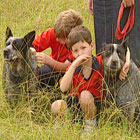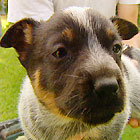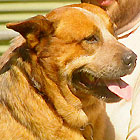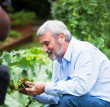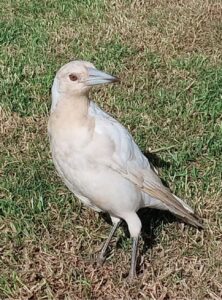Breed: Australian Cattle Dog
Temperament: loyal, sometimes dangerous
Maintenance: low
Longevity: 10-13 years
Recommended for: active families
History
There is great debate over the origin of the cattle dog, with stories of its development in both NSW and Queensland. They have been called Hall’s Heelers, Queensland Blue Heelers and Blueys. No records of the original breeding are left, although it is suggested that Blue Merle Collies and perhaps even Bull Terriers were used. The dogs were bred for endurance, toughness and herding abilities. While Australia’s cattle industry was developing these dogs were well suited to the wild terrain and the feral elements of the cattle. Over the years they have been less and less useful because of their roughness. These days cattle are more quiet and dogs such as kelpies and border collies are far more adept at handling livestock in a quiet way. Australian Cattle Dogs rarely find a place as a working dog anymore. Despite their waning appeal as working dogs the Australia Cattle Dog remains a lasting representation of Australian bush culture. They are instantly recognisable and their legend for toughness and loyalty will live on. They are one of the three most popular dog breeds owned in Australia.
Appearance
Australian Cattle Dogs are a strong, compact and solid dog. They give the impression of a dog that is tough, alert and agile. They have a strong head and broad face with upright ears. It is normal for dogs to have an initial cautious glint or look in the eye. They come in blue or red, with distinctive patterns of mottling and block colour. The dogs have short powerful legs and a medium length thick tail that helps the dog balance and turn when moving around quickly.
Temperament
The Australian Cattle Dog is best described as intelligent, energetic and fiercely loyal. Many Australian Cattle Dogs will bite a stranger and some are quite unstable, biting people if they look at the dog or get between the dog and its owner. Many owners find their dogs need lots of activity and to be kept occupied in order to keep them happy. They need to be trained from an early age. They are usually loyal to one or two people. Their physical attributes and stamina are not what they used to be. As working dogs, the short legged, chunky modern Australian cattle dogs could not hope to compete with kelpies or border collies. There is some concern over the issue of fear biting, although dogs can be bred without this problem. A good breeder will produce dogs specifically for their temperament with breed standards an important, but secondary, consideration.
Experts say that in the past Australian Cattle Dogs were bred with a genetic disposition to bite. Since they are now used almost exclusively as pets this behaviour must urgently be bred out. In general few breeders of Australian cattle dogs are making an effort to improve the temperament of the breed. However the dogs featured in our road test are vastly improved over the general run of the breed. These dogs were brought together for the road test by breeder Sandra Stapley of Sydney. Her line is based on that of Val Kirk a breeder from the Hunter Valley, NSW, who was also featured on the segment. These breeders are selecting better dogs with safer temperaments and we would suggest these are the only strain of Australian Cattle Dogs that we would recommend.
Maintenance and care
The Australian Cattle Dog is very low maintenance and owners say they do not need brushing and need only be bathed once a year if at all. The majority of Cattle Dog owners say the dogs need lots of activity, whether in the form of exercise or interaction with people. They can be backyard dogs but should have space and things to keep them occupied.
Training
It is recommended that Australian Cattle Dogs receive training from an early age and, if they are to be a family dog, they should be immediately introduced to family members and allowed to mix with other people as soon as possible. Upbringing is very important to the breed and they need to know who is boss straight away. These dogs can be trained to do almost any kind of task and relish the opportunity to please.
Health and lifespan
Cattle Dogs do not have any significant health problems except those associated with the merle gene. Deaf puppies may be produced and are difficult to raise. A Cattle Dog called Bluey is credited as being the longest living dog ever. He lived to 29 years of age and worked sheep for 20 of those years. Most cattle dogs will live for about 10 -13 years.
Recommended for
Australian Cattle Dogs are best suited for those who can allow the dog to be a constant companion. The dogs must have constant contact with people if they are to remain manageable. Families are most suitable provided they buy a dog with proven temperament and give the dog obedience training, activity and lots of companionship.
National contacts
To find up-to-date contacts for breeders, contact the following organisations.
The Australian National Kennel Council (ANKC)
www.ankc.org.au
Dogs NSW
http://www.dogsnsw.org.au/breeders-directory
Email: [email protected]
Phone: 1300 728 022 (NSW only) or (02) 9834 3022
Fax: (02) 9834 3872
Dogs Victoria
http://www.vca.org.au
Email: [email protected]
Phone: (03) 9788 2500
Fax: (03) 9788 2599
Dogs ACT
http://www.actca.asn.au
Email: [email protected]
Phone: (02) 6241 4404 – Fax: (02) 6241 1129.
Dogs West
http://www.cawa.asn.au
Email: [email protected]
Phone: (08) 9455 1188
Fax: (08) 9455 1190
Dogs SA
http://dogssa.com.au
Phone: (08) 8349 4797
Canine Control Council of Queensland
http://www.cccq.org.au
Email: [email protected]
Phone: (07) 3252 2661
Fax: (07) 3252 3864
Tasmanian Canine Association
http://www.tasdogs.com
Email: [email protected]
Phone: (03) 6272 9443
Fax: (03) 6273 0844
Dogs NT
http://www.territorydogworld.com
Email: [email protected]
Phone: (08) 8984 3570
Fax: (08) 8984 3409
The Australian National Kennel Council (ANKC)
www.ankc.org.au
Dogs NSW
http://www.dogsnsw.org.au/breeders-directory
Email: [email protected]
Phone: 1300 728 022 (NSW only) or (02) 9834 3022
Fax: (02) 9834 3872
Dogs Victoria
http://www.vca.org.au
Email: [email protected]
Phone: (03) 9788 2500
Fax: (03) 9788 2599
Dogs ACT
http://www.actca.asn.au
Email: [email protected]
Phone: (02) 6241 4404 – Fax: (02) 6241 1129.
Dogs West
http://www.cawa.asn.au
Email: [email protected]
Phone: (08) 9455 1188
Fax: (08) 9455 1190
Dogs SA
http://dogssa.com.au
Phone: (08) 8349 4797
Canine Control Council of Queensland
http://www.cccq.org.au
Email: [email protected]
Phone: (07) 3252 2661
Fax: (07) 3252 3864
Tasmanian Canine Association
http://www.tasdogs.com
Email: [email protected]
Phone: (03) 6272 9443
Fax: (03) 6273 0844
Dogs NT
http://www.territorydogworld.com
Email: [email protected]
Phone: (08) 8984 3570
Fax: (08) 8984 3409


